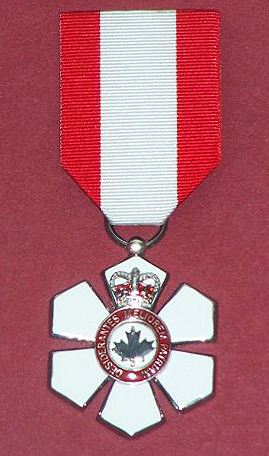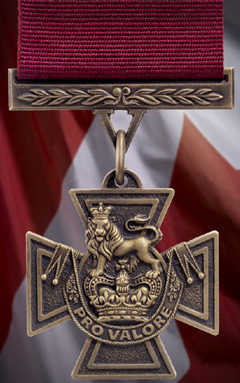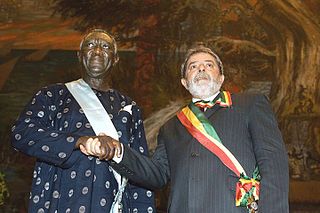In the United Kingdom and the British Overseas Territories, personal bravery, achievement, or service are rewarded with honours. The honours system consists of three types of award:

The Order of Canada is a Canadian state order and the second-highest honour for merit in the system of orders, decorations, and medals of Canada, after the Order of Merit.

The Most Excellent Order of the British Empire is a British order of chivalry, rewarding contributions to the arts and sciences, work with charitable and welfare organisations, and public service outside the civil service. It was established on 4 June 1917 by King George V and comprises five classes across both civil and military divisions, the most senior two of which make the recipient either a knight if male or dame if female. There is also the related British Empire Medal, whose recipients are affiliated with, but not members of, the order.

The New Zealand Order of Merit is an order of merit in the New Zealand royal honours system. It was established by royal warrant on 30 May 1996 by Elizabeth II, Queen of New Zealand, "for those persons who in any field of endeavour, have rendered meritorious service to the Crown and nation or who have become distinguished by their eminence, talents, contributions or other merits", to recognise outstanding service to the Crown and people of New Zealand in a civil or military capacity.

The Royal Victorian Order is a dynastic order of knighthood established in 1896 by Queen Victoria. It recognises distinguished personal service to the British monarch, Canadian monarch, Australian monarch, or New Zealand monarch, members of the monarch's family, or to any viceroy or senior representative of the monarch. The present monarch, King Charles III, is the sovereign of the order. The order's motto is Victoria. The order's official day is 20 June. The order's chapel is the Savoy Chapel in London.

John Agyekum Kufuor is a Ghanaian politician who served as the President of Ghana from 7 January 2001 to 7 January 2009. He also became the Chairperson of the African Union from 2007 to 2008 and his victory over John Evans Atta Mills after the end of Jerry Rawlings' second term marked the first peaceful democratic transition of power in Ghana since independence in 1957.
Latin honors are a system of Latin phrases used in some colleges and universities to indicate the level of distinction with which an academic degree has been earned. The system is primarily used in the United States. It is also used in some Southeastern Asian countries with European colonial history, such as Indonesia and the Philippines, and African countries such as Zambia and South Africa, although sometimes translations of these phrases are used instead of the Latin originals. The honors distinction should not be confused with the honors degrees offered in some countries, or with honorary degrees.

An order is a visible honour awarded by a sovereign state, monarch, dynastic house or organisation to a person, typically in recognition of individual merit, that often comes with distinctive insignia such as collars, medals, badges, and sashes worn by recipients.
The orders, decorations, and medals of Canada comprise a complex system by which Canadians are honoured by the country's sovereign for actions or deeds that benefit their community or the country at large. Modelled on its British predecessor, the structure originated in the 1930s, but began to come to full fruition at the time of Canada's centennial in 1967, with the establishment of the Order of Canada, and has since grown in both size and scope to include dynastic and national orders, state, civil, and military decorations; and various campaign medals. The monarch in right of each Canadian province also issues distinct orders and medals to honour residents for work performed in just their province. The provincial honours, as with some of their national counterparts, grant the use of post-nominal letters and or supporters and other devices to be used on personal coats of arms.

The Victoria Cross was created in 1993, perpetuating the lineage of the British Victoria Cross, while serving as the highest award within the Canadian honours system, taking precedence over all other orders, decorations, and medals. It is awarded by either the Canadian monarch or his viceregal representative, the governor general of Canada, to any member of the Canadian Armed Forces or allies serving under or with Canadian military command for extraordinary valour and devotion to duty while facing hostile forces. The British Victoria Cross was recommended prior to the creation of the Canadian medal. The previous Victoria Cross remains the highest award of the United Kingdom honours system and was also awarded in other Commonwealth countries; although most, including Canada, later established their own honours systems and no longer recommended British honours.
Hero of Ukraine is the highest national decoration that can be conferred upon an individual citizen by the President of Ukraine.
South African orders, decorations and medals are those military and civilian orders, decorations and medals issued by the Government of South Africa. The following is a (non-exhaustive) list of these:
Nigerian National Honours are a set of orders and decorations conferred upon Nigerians and friends of Nigeria every year. They were instituted by the National Honors Act No. 5 of 1964, during the First Nigerian Republic, to honour Nigerians who have rendered service to the benefit of the nation.

Nana Addo Dankwa Akufo-Addo is a Ghanaian politician who has served as the president of Ghana since 2017. He previously served as Attorney General from 2001 to 2003 and as Minister for Foreign Affairs from 2003 to 2007 under the Kufuor-led administration.
In the Democratic Socialist Republic of Sri Lanka, individuals are recognized for personal bravery, achievement, or service with the with national honours. The national honours consists of several types of award:

The Order of the Star of Ghana is the second-highest award given by the Government of Ghana to any individual who had helped the cause of the country in one way or the other. Recipients of this award are decorated at a state function, chaired by the President of the Republic. It was the highest national award until 23 June 2008, when it was superseded by the Grand Order of the Star and Eagles of Ghana.
There are four orders in Ghana: Order of the Star of Ghana, Order of the Volta, Medal for Gallantry and Grand Medal.

Elizabeth II was Queen of Ghana from 1957 to 1960, when Ghana was an independent sovereign state and a constitutional monarchy. She was also queen of the United Kingdom and other sovereign states. Her constitutional roles in Ghana were delegated to the governor-general of Ghana.
The Order of the Volta is an order of merit from the Republic of Ghana. It was instituted in 1960 and is awarded to people for their outstanding service to the country.
The National Honours and Awards is a national awards ceremony that honours Ghanaian people who have rendered distinguished services to Ghana in various fields and careers. The ceremony is held on 30 June every year in Ghana.









